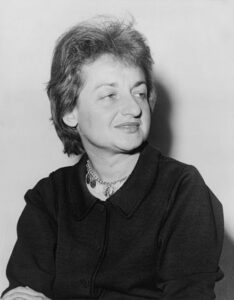
Betty Friedan (Feb. 4, 1921 – Feb. 4, 2006) was born Bettye Naomi Goldstein in Illinois to jewelry store owner Harry Goldstein and his wife Miriam Horwitz, who became a society page writer for a local newspaper. She participated as a youth in Jewish and Marxist circles. Turned down as a columnist for the Peoria High School newspaper, she and six friends launched a literary magazine called Tide. At Smith College, she published poetry and became editor in chief in 1941 of Smith College Associated News, during which she took an antiwar stance. She graduated summa cum laude and Phi Beta Kappa in 1942 with a BA in psychology. The following year she did graduate study at UC Berkeley.
She wrote for such left-wing publications as the Federated Press and the United Electrical Workers’ UE News, losing her job at the UE News when she became pregnant with her second child. She then freelanced for various magazines, including Cosmopolitan. In 1963, she wrote The Feminine Mystique, which described the “problem that has no name” at the beginning of the book: “The problem lay buried, unspoken, for many years in the minds of American women. It was a strange stirring, a sense of dissatisfaction, a yearning [that is, a longing] that women suffered in the middle of the 20th century in the United States. Each suburban [house]wife struggled with it alone. As she made the beds, shopped for groceries … she was afraid to ask even of herself the silent question – ‘Is this all?’ ” The Feminine Mystique was a bestseller credited with igniting a wave of feminism in the 1960s.
In 1966, Friedan became the founding president of the National Organization for Women (NOW), which pushed the federal Equal Employment Opportunity Commission to take seriously claims from women that they were discriminated against at their jobs because of their gender. It also advocated for the Equal Rights Amendment, for the legalization of abortion, and for national daycare. She stepped down as NOW president in 1969, but remained active in the cause, leading a 20,000-women strong strike for equality in New York City. She successfully opposed confirmation of Supreme Court nominee G. Harrold Carswell on grounds of his antifeminism, and in 1971 with other women, including archrival Gloria Steinem, founded the National Women’s Political Caucus.
Betty and Carl Friedan (ne Friedman), a theater producer, were married in 1947 and divorced in 1969. The couple had three children, Daniel, Emily and Jonathan. In 1973, she signed the Humanist Manifesto, which rejected theism, deism and belief in an afterlife.
Tomorrow: February 5: Red Buttons
*
SDJW condensation of a Wikipedia article